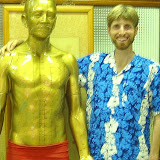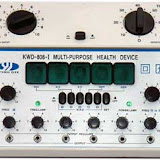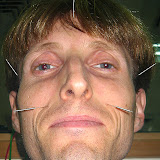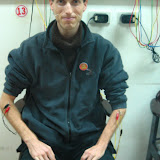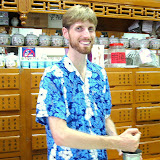My First Acupuncture Experience
A friend and I have plans for a video of the Acupuncture Experience, but here's a vision through words to warm you up...
Imagine walking into a room... with 20 chairs lined up. An electric box above each chair with multi-color wires hanging down from each box. These wires connect to the needles that will be inserted into the acupuncture points of your body. The nurse takes you over to a seat and you sit next to another patient waiting to get stuck. Then after waiting for awhile, the good doctor roles on up with his cart of needles and sundry gadgets that can return balance and harmony to your chi flow. 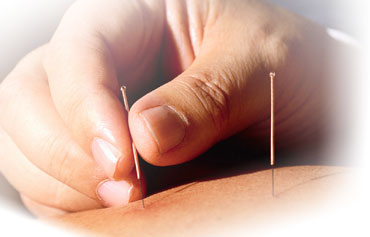
The person next to you gets the treatment first... Thank Goddess!, so you get to watch the guy next to you first. Psychologically tormenting to watch each needle go in, but simultaneously calming and easing because he seems unmoved. The patient just sits stoically as each needle is inserted... I gain confidence. Then another nurse follows the doctor up by putting cotton enveloped herbal balls (of mugwort) on the end of some of his needles. Then they are lit like incense to slowly burn and add heat to the acupuncture points. The smoke is soothing and irritating, yin and yang. Now time to juice the patient up with some voltage. The multi-colored wires you noticed before, hanging from the electrocuting boxes, are now attatched to some of the needles by clasps. Mild, stimulating, current is then fed to the needles in alternating flows of existence and nothingness, thus causing his muscles to twitch around the electrofied points.
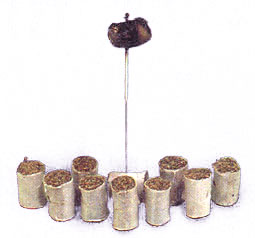
Now, it's your turn... Lai2 (come), your turn. Each one time use, disposable needle is in a plastic tube of equal length. The needle is said to be as thin as a hair (well it's not, but it is really thin). The doctor puts the plastic tube to your skin. He gives one good tap to the needles head to drive the needle through your skin (and a few other dermal layers). There is a sharp pain sometimes, and sometimes no pain. Then a numbness ensues for a few minutes until you become assimilated and your mind wanders to other things. After 30 minutes, the nurse returns to remove the needles and uses a cotton swab to swab up the miniscule drop of blood that sometimes forms at the point of removal.
Benefit?: I've been using Chinese Medicine for 5 years and have had great results with it for treating common colds, chronic sinusitis (including thick green mucous), allergies, chronic coughs lasting months, and general joint soreness. For the chronic sinusitis, western doctors only offered antibiotics or surgery, both of which I prefer to avoid. I've now been going for the 30 minute acupuncture treatments 6 days a week for over a month. I feel my chronic sinus issues are improving to a whole new level of wellness that chinese herbal medicine alone did not bring me to. I'm quite impressed and will continue to go daily. The Doctor recommends I do daily tratments for 3 months... especially because of my weak physical condition.
Cost?: Taiwan's insurance covers 80% of the treatment cost. I pay $1.70 USD for each 30 minute visit. And $5 for one weekly visit which includes diagnosis by the doctor and a new week's worth of chinese herbal medicine. Soooooo cheap! I've heard acupuncture treatments in the States cost $50-$70 per treatment, and I imagine herbal medicine can be pricey as well. So I'm racking up the Chinese Medicine experiences while I'm here.
Diagnosis?: Chinese medicine's other main treatment method is it's herbal medicine. The doctor asks a few questions. How's your sleep? How is your appetite, bowel movements, and dreams? The doctor will look at your tongue (and the coating on it). Then the doctor will ask you to put your wrist upon a cute little pillow and using two fingers, he will feel your pulse. There are 37? different kinds of pulses that tell the doctor much about your physical condition. I've actually sat down to see a Chinese Doctor, meeting him for the first time, and without saying a word, he “listened” to my pulse and told me my ear, nose, and throat history from childhood. Miraculous? Well, he probably wouldn't call it miraculous, considering how many years he studied and practiced to aquire this skill. He'd probably call it hard work and science. So, we see there is a science to Chinese medicine, though quite a different science from that of western medicine.
To learn more about Chinese Medicine and Nutrition, I've been reading:
Enjoy your first Accupuncture Session! Tell me about it!!!
Happy Punctures
